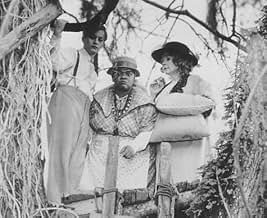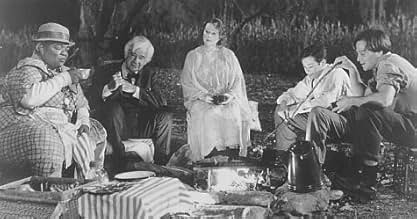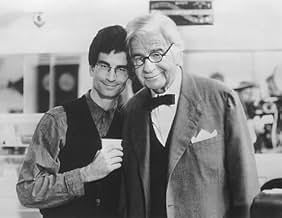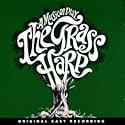Becoming an orphan in 1935, Collin moves to his dad's cousins Verena and Dolly. Verena is a rich, bossy businesswoman. Dolly, Collin and the maid revolt, moving to a tree house.Becoming an orphan in 1935, Collin moves to his dad's cousins Verena and Dolly. Verena is a rich, bossy businesswoman. Dolly, Collin and the maid revolt, moving to a tree house.Becoming an orphan in 1935, Collin moves to his dad's cousins Verena and Dolly. Verena is a rich, bossy businesswoman. Dolly, Collin and the maid revolt, moving to a tree house.
- Director
- Writers
- Stars
- Awards
- 3 wins total
- Director
- Writers
- All cast & crew
- Production, box office & more at IMDbPro
Featured reviews
On the surface this story is about love and our connections to others - both living and dead. Yet underneath run themes of social injustice, racial inequality, religion, morals and the struggles of social conformity vs. individual expression - but the film never preaches. It just reveals.
Director Charles Matthau accomplished the near-impossible task of adapting Truman Capote's classic book into a beautiful rendered film. Wisely, he approached this multi-layered story with a light touch, allowing the material and talent to shine. Matthau skillfully captures a myriad of complex relationships and emotions, allowing the characters to live and breathe without placing judgment on who they are.
The boy's coming-of-age story is entertaining, humorous and poignant. As the film unfolds, Collin encounters a diverse group of characters, from which he gains valuable insights about life. Now an adult he looks back (as the narrator) reflecting on this formative time.
Each character is uniquely distinct and true-to-life. The entire all-star cast is at the top of their game.
This is the best performance of Piper Laurie's career. She is delicate and mesmerizing as the fragile Dolly Talbo. Her scenes with Spacey and Matthau will break your heart.
For those of you who have only seen Walter Matthau in grumpy curmudgeon roles, you are in for a treat!
Matthau is wonderful as a Judge Cool, a Southern gentleman struggling to find meaning in his retirement years. As Piper Laurie's love interest he is tender and charming yet dignified. A man of integrity and honor, Judge Cool is the only "accepted" towns person with compassion for the outcasts.
As a collective, the ensemble cast captures the social pecking order with uncanny accuracy.
Jon Don Baker is great as the Sheriff, Nell Carter is a hoot as the eccentric housekeeper and Sissy Spacek is an amazing blend of steely resolve masking her conflicted feelings of vulnerability and insecurity.
Roddy McDowell is the delightfully sarcastic barber. Jack Lemmon and Mary Steenbergen are great fun as cons on the run. Mary as a traveling cowgirl evangelist out to save souls - never mind that she is a single- mother of fourteen kids all by different fathers! She pulls it off with comic charm and sad poignancy. Lemmon is a "chemical engineer" (read quack potions salesman) with a scheme to get his hands on Dolly's herbal potion. Even though both Lemmon and Steenbergen are devious cons looking to score, they too are well-developed characters and oh-so-human in their desperate schemes to survive the Great Depression.
There is also one of the most delightful casts of furry creatures ever assembled: a host of cats, dogs, fish, and a scene-stealing Rooster named Ralph. It looked to me like Ralph was huffing around wishing he had more lines. I'd be all for him getting his own sequel.
Walter Matthau is retired Judge Cool, a sensible elderly man who "good" people consider a nut (he openly admits that there was nothing wrong with a true love affair between a white man and an African-American woman which led to the white man being run out of town). Matthau is having problems in his home with an unsympathetic grown son and the son's wife. Matthau's wife has died years before. Others in this well cast film include Jack Lemmon as a Dr. Ritt from Chicago, whom Spacek brings back home - and whom accidentally sets in motion the delayed rebellion of Laurie and the others against Spacek's stiff and respectable regime. Joe Don Baker plays the local chicken rancher/part-time sheriff (who hates having to cow-tow to Spacek). Charles Durning is the local minister, who is out for only respectable religious leaders (with Bonnie Bartlett as his equally stuffy wife). Mary Steenburgen is the religious threat - an unmarried mother of twelve who has a mobile revival tent in the back country, but whom is pretty likable for all one's questions about her revivalism. Sean Patrick Flannery is Riley, a young man who lives unconventionally, but whom turns out to be a pretty good friend to Collin. Roddy McDowall (in one of his last roles) plays Amos, the local barber.
Basically Capote uses his characters to punch holes in what "nice, conventional" small town people believe is proper behavior. Spacek is the leader of these people, who believe in organized Christianity, hard work and business, and straight-laced morality. Laurie, Matthau, Carter, Flannery, Steenburgen, and Furlong are all believers in doing what is natural, and from the heart. So as they begin working together they become a model and a danger for the "nice people". But as the tale progresses, the nice people find that what they believe in does not emotionally satisfy them. Indeed Spacek suffers several losses in the course of the film that she never expected.
Charles Matthau, Walter's son, directed this (very nicely - it is one of the best ensemble movies of recent years). It was also a rarity in the 1990s decade of Matthau-Lemmon films. Whereas GRUMPY OLD MEN, GRUMPIER OLD MEN, OUT TO SEA, and THE ODD COUPLE II were all comedies, this film is dramatic and the two actors only shared one scene (with Roddy McDowall in his barber shop) in the film. Also, Lemmon's character is less likable than usual in this film.
The title, by the way, refers to a statement by Laurie's character about how the grass gives off a music like a harp, which is actually the voices of all the people who ever inhabited the earth. It becomes a running metaphor in the film up to the conclusion.
As the story begins in a prologue set in 1935, a young boy (Edward Furlong) is sent to live with his two spinster aunts following the death of his parents. These aunts might be sisters, but they are decidedly different; one is a hard-nosed businesswoman who owns many of the shops in town (Sissy Spacek), the other (Piper Laurie) is gentle and childlike, keeps house, and makes a homeopathic dropsy cure. After a few years pass, the two sisters have a falling out over taking the homeopathic cure into a factory setting, Laurie, Furlong, and maid Nell Carter decamp to the woods while waiting for Spacek to change her mind.
That is the main thrust of the plot, but there are all sorts of familiar faces in here as well: Walter Matthau as a retired judge and suitor for Laurie, Mary Steenburgen as a tent revivalist with 15 children, and brief cameos from the likes of Jack Lemmon, Roddy McDowell, Charles Durning, Scott Wilson, and Doris Roberts. This film is very little known, but it's worth tracking down for Laurie's performance especially.
Having said that, the one criticism I have of the movie is that I didn't really CARE about the characters. I enjoyed very much watching the characters interact, and being reminded of life in a world that has almost completely disappeared. But I was more amused by them than passionate about them.
While this film may not be perfect, it's a wonderful movie; more intelligent than at least 90% of what comes out of Hollywood. As another reviewer suggested, if you have a couple of hours of quiet time, sit down with a glass of wine and enjoy.
Based on Southern writer Truman Capote's boyhood, the story reveals the nuances of small town life with humor and wit. The lush visuals and lyric pace create a leisure mood befitting the 1930's when life was simpler. The golden sepia tones of the scenes subtly transport us into the memories of Collin, through whose eyes the story is told. The Southern ambiance, social graces and simple pastimes of a bygone era are beautifully recreated in the world surrounding the characters.
I love the barbershop scenes, where locals gather to socialize and get the latest news. You just want to hang out in the shop and shoot the breeze with Walter Matthau and Roddy McDowell. Joe Don Baker is the perfect southern sheriff and his sidekick Ralph (a rooster) adds a hilarious touch of eccentricity to his tough good-old boy demeanor. Charles Durning is hilarious as a self-righteous preacher that can't wait to kick Mary Steenbergen and her brood of a dozen kids out of town.
Piper Laurie is the heart and soul of the movie as Dolly Talbo. The timid and ethereal Dolly has been living under the thumb of her overbearing sister (Sissy Spacek) but manages to create a unique life of meaning for herself. Edward Furlong plays their teen nephew Collin who comes to live with them.
Dolly and her housekeeper (Nell Carter) take Collin under their wing and try to help him adjust to life in this small southern town. As Dolly advises Collin about the girl he has a crush on, she too falls in love for the first time in her life.
Piper Laurie glows like a young girl around the young-at-heart Judge Cool (Walter Matthau). Their scenes together are sweet and heartbreaking.
The movie is beautiful, both visually and emotionally. It is funny, sad, and touching. Don't rush this viewing. Sit down with a glass of wine and savor.
The Grass Harp is a feast for the eyes and soul!
Did you know
- TriviaIn "Carrie" (1976), Piper Laurie and Sissy Spacek played mother and daughter, respectively. Here, they play sisters.
- GoofsWhen the men fall out the treehouse and land on the ground, the leaves slide in a large square revealing the crash pad.
- Quotes
Mrs. Peters: Shame on you Dolly Talbo, sittin up in that tree like a drunken Indian, smoking on cigarettes like a common... Floozy
Mrs. Buster: Floozy
Catherine Creek: Preacher lady don't you be callin Ms. Dolly here no floozy now, why I come down there and slap you bow-legged.
- ConnectionsReferenced in Walter Matthau: Diamond in the Rough (1997)
- SoundtracksRock of Ages
Written by Augustus Montague Toplady, Thomas Hastings
Performed by Bonnie Bartlett, Charles Durning
- How long is The Grass Harp?Powered by Alexa
Details
- Release date
- Country of origin
- Official site
- Language
- Also known as
- Çimen Türküsü
- Filming locations
- Production companies
- See more company credits at IMDbPro
Box office
- Budget
- $8,000,000 (estimated)
- Gross US & Canada
- $559,771
- Opening weekend US & Canada
- $117,161
- Oct 13, 1996
- Gross worldwide
- $559,771
- Runtime1 hour 47 minutes
- Color
- Sound mix
- Aspect ratio
- 1.85 : 1
Contribute to this page

























